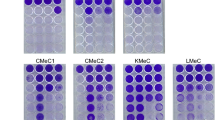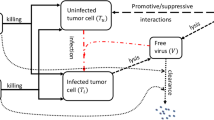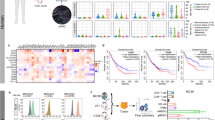Abstract
There is increasing evidence about the use of oncolytic adenoviruses (Ads) as promising immunotherapy agents. We have previously demonstrated the clinical efficiency of mesenchymal stem cells (MSCs) infected with oncolytic Ads as an antitumoral immunotherapy (called Celyvir) in human and canine patients, using ICOVIR-5 or ICOCAV17 as human and canine oncolytic Ads, respectively. Considering the better clinical outcomes of canine patients, in this study we searched for differences in cellular responses of human and canine MSCs to Ad infection that may help understand the mechanisms leading to higher antitumor immune response. We found that infection of human and canine MSCs with ICOVIR-5 or ICOCAV17 did not activate the NF-κB pathway or the interferon regulatory factors IRF3 and IRF7. However, we observed differences in the profile of cytokines secretion, as infection of canine MSCs with ICOCAV17 resulted in lower secretion of several cytokines. Moreover, we showed that infection of human MSCs with ICOVIR-5 increased the phosphorylation of a number of proteins, including AKT and c-JUN. Finally, we demonstrated that differences in regulation of AKT and c-JUN in human and canine MSCs by ICOVIR-5 or ICOCAV17 are intrinsic to each virus. Our findings suggest that ICOCAV17 induces a more limited host response in canine MSCs, which may be related to a better clinical outcome. This result opens the possibility to develop new human oncolytic Ads with these specific properties. In addition, this improvement could be imitated by selecting specific human MSC on the basis of a limited host response after Ad infection.
This is a preview of subscription content, access via your institution
Access options
Subscribe to this journal
Receive 12 print issues and online access
$259.00 per year
only $21.58 per issue
Buy this article
- Purchase on Springer Link
- Instant access to full article PDF
Prices may be subject to local taxes which are calculated during checkout




Similar content being viewed by others
References
Garnock-Jones K. Talimogene Laherparepvec: a review in unresectable metastatic melanoma. BioDrugs. 2016;30:461–8.
García-Castro J, Alemany R, Cascalló M, Martínez-Quintanilla J, Arriero MM, Lassaletta A, et al. Treatment of metastatic neuroblastoma with systemic oncolytic virotherapy delivered by autologous mesenchymal stem cells: an exploratory study. Cancer Gene Ther. 2010;17:476–83.
Melen GJ, Franco-Luzon L, Ruano D, Gonzalez-Murillo A, Alfranca A, Casco F, et al. Influence of carrier cells on the clinical outcome of children with neuroblastoma treated with high dose of oncolytic adenovirus delivered in mesenchymal stem cells. Cancer Lett. 2016;371:161–70.
Ruano D, Lopez-Martin JA, Moreno L, Lassaletta A, Bautista F, Andion M, et al. First-in-human, first-in-child trial of autologous MSCs carrying the oncolytic virus Icovir-5 in patients with advanced tumors. Mol Ther. 2020;28:1033–42.
Rincón E, Cejalvo T, Kanojia D, Alfranca A, Rodríguez-Milla MA, Gil Hoyos RA, et al. Mesenchymal stem cell carriers enhance antitumor efficacy of oncolytic adenoviruses in an immunocompetent mouse model. Oncotarget. 2017;8:45415–31.
Morales-Molina A, Gambera S, Cejalvo T, Moreno R, Rodriguez-Milla MA, Perise-Barrios AJ, et al. Antitumor virotherapy using syngeneic or allogeneic mesenchymal stem cell carriers induces systemic immune response and intratumoral leukocyte infiltration in mice. Cancer Immunol Immunother. 2018;67:1589–602.
Cejalvo T, Perisé-Barrios AJ, Portillo Id, Laborda E, Rodriguez-Milla M, Cubillo I, et al. Remission of spontaneous canine tumors after systemic cellular viroimmunotherapy. Cancer Res. 2018;78:4891–901.
Paoloni M, Khanna C. Translation of new cancer treatments from pet dogs to humans. Nat Rev Cancer. 2008;8:147–56.
Leopold PC. RG. Intracellular trafficking of adenovirus: many means to many ends. Adv Drug Deliv Rev. 2007;59:810–21.
Fejer G, Freudenberg M, Greber U, Gyory I. Adenovirus-triggered innate signalling pathways. Eur Jl Microbiol Immunol. 2011;1:279–88.
Flatt J, Butcher S. Adenovirus flow in host cell networks. Open Biol. 2019;9:190012.
Atasheva S, Shayakhmetov D. Adenovirus sensing by the immune system. Curr Opin Virol. 2016;21:109–13.
Perreau M, Mennechet F, Serratrice N, Glasgow J, Curiel D, Wodrich H, et al. Contrasting effects of human, canine, and hybrid adenovirus vectors on the phenotypical and functional maturation of human dendritic cells: implications for clinical efficacy. J Virol. 2007;81:3272–84.
Piersanti S, Astrologo L, Licursi V, Costa R, Roncaglia E, Gennetier A, et al. Differentiated neuroprogenitor cells incubated with human or canine adenovirus, or lentiviral vectors have distinct transcriptome profiles. PLoS ONE. 2013;8:e69808.
Cascallo M, Alonso M, Rojas J, Perez-Gimenez A, Fueyo J, Alemany R. Systemic toxicity-efficacy profile of ICOVIR-5, a potent and selective oncolytic adenovirus based on the pRB pathway. Mol Ther. 2007;15:1607–15.
Laborda E, Puig-Saus C, Rodriguez-Garcia A, Moreno R, Cascallo M, Pastor J, et al. A pRb-responsive, RGD-modified, and hyaluronidase-armed canine oncolytic adenovirus for application in veterinary oncology. Mol Ther. 2014;22:986–98.
Segura MM, Monfar M, Puig M, Mennechet F, Ibanes S, Chillon M. A real-time PCR assay for quantification of canine adenoviral vectors. J Virol Methods. 2010;163:129–36.
Wilson A, Kwok L, Porter E, Payne J, McElroy G, Ohle S, et al. Lentiviral delivery of RNAi for in vivo lineage-specific modulation of gene expression in mouse lung macrophages. Mol Ther. 2013;21:825–33.
Szklarczyk D, Gable AL, Lyon D, Junge A, Wyder S, Huerta-Cepas J, et al. STRING v11: protein-protein association networks with increased coverage, supporting functional discovery in genome-wide experimental datasets. Nucleic Acids Res. 2019;47(D1):D607–d13.
Doronin K, Flatt JW, Di Paolo NC, Khare R, Kalyuzhniy O, Acchione M, et al. Coagulation factor X activates innate immunity to human species C adenovirus. Science. 2012;9:795–8.
McCleese J, Bear M, Kulp S, Mazcko C, Khanna C, London C. Met interacts with EGFR and Ron in canine osteosarcoma. Vet Comp Oncol. 2013;11:124–39.
Treacy O, Ryan A, Heinzl T, O’Flynn L, Cregg M, Wilk M, et al. Adenoviral transduction of mesenchymal stem cells: in vitro responses and in vivo immune responses after cell transplantation. PLoS ONE. 2012;7:e42662.
Bowick G, Fennewald S, Scott E, Zhang L, Elsom B, Aronson J, et al. Identification of differentially activated cell-signaling networks associated with Pichinde virus pathogenesis by using systems kinomics. J Virol. 2007;81:1923–33.
Cooray S. The pivotal role of phosphatidylinositol 3-kinase–Akt signal transduction in virus survival. J Gen Viro. 2004;85:1065–76.
Rajala MS, Rajala RV, Astley RA, Butt AL, Chodosh J. Corneal cell survival in adenovirus type 19 infection requires phosphoinositide 3-kinase/Akt activation. J Virol. 2005;79:12332–41.
Klein S, Piya S, Lu Z, Xia Y, Alonso M, White E, et al. C-Jun N-terminal kinases are required for oncolytic adenovirus-mediated autophagy. Oncogene. 2015;34:5295–301.
Li E, Stupack D, Klemke R, Cheresh DA, Nemerow GR. Adenovirus endocytosis via α v integrins requires phosphoinositide-3-OH kinase. J Virol. 1998;72:2055–61.
Soudais C, Boutin S, Hong Sea. Canine adenovirus type 2 attachment and internalization: coxsackievirus-adenovirus receptor, alternative receptors, and an RGD-independent pathway. J Virol. 2000;74:10639–49.
Dmitriev I, Krasnykh V, Miller CR, Wang M, Kashentseva E, Mikheeva G, et al. An adenovirus vector with genetically modified fibers demonstrates expanded tropism via utilization of a coxsackievirus and adenovirus receptor-independent cell entry mechanism. J Virol. 1998;72:9706–13.
Seiradake E, Lortat-Jacob H, Billet O, Kremer EJ, Cusack S. Structural and mutational analysis of human Ad37 and canine adenovirus 2 fiber heads in complex with the D1 domain of coxsackie and adenovirus receptor. J Biol Chem. 2006;281:33704–16.
Acknowledgements
We thank Isabel Cubillo Moreno for her technical support in the study.
Funding
This study was funded by Instituto de Salud Carlos III (PI14CIII/00005 and PI17CIII/00013 grants), Consejería de Educación, Juventud y Deporte of Comunidad de Madrid (P2017/BMD-3692 grant), Fundación Oncohematología Infantil, AFANION, and Asociación Pablo Ugarte, whose support we gratefully acknowledge.
Author information
Authors and Affiliations
Corresponding author
Ethics declarations
Conflict of interest
The authors declare that they have no conflict of interest.
Additional information
Publisher’s note Springer Nature remains neutral with regard to jurisdictional claims in published maps and institutional affiliations.
Supplementary information
Rights and permissions
About this article
Cite this article
Rodríguez-Milla, M.Á., Morales-Molina, A., Perisé-Barrios, A.J. et al. AKT and JUN are differentially activated in mesenchymal stem cells after infection with human and canine oncolytic adenoviruses. Cancer Gene Ther 28, 64–73 (2021). https://doi.org/10.1038/s41417-020-0184-9
Received:
Revised:
Accepted:
Published:
Issue Date:
DOI: https://doi.org/10.1038/s41417-020-0184-9



